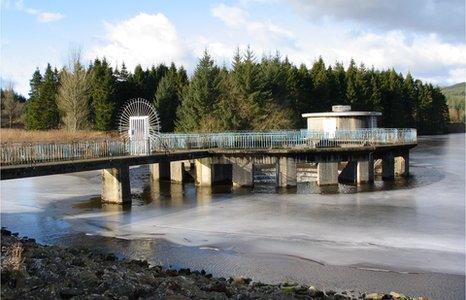Drought concern follows Dumfries and Galloway dry spell
- Published

Water supplies at the Black Esk reservoir are well below where they would normally be at this time of year due to the lack of rainfall
A first Scottish drought order in five years is being considered due to a prolonged dry spell in Dumfries and Galloway.
Scottish Water said reservoir levels in the region had dropped well below normal for the time of year.
A spokesman said customers could help by taking a few "simple steps" to help save water.
He said they would prefer to avoid a drought order but had to be ready should the "situation escalate".
Latest information from Scottish Water was that the reservoirs causing concern - Black Esk and Penwhirn - were holding their levels.
However, the company said it had to look at further action.
"If we do not see an increase in rainfall then we will have to seriously consider actions such as applying for the drought order," said a spokesman.
The two reservoirs serve the areas of Annandale and Eskdale and Wigtownshire.
Customer service director Peter Farrer said the public should be unaffected at the moment, but said the situation was out of the ordinary.
"Dumfries and Galloway has experienced some of the most prolonged periods of no or low rainfall," he said.
"For May it was only 63% of normal levels and even drier conditions have been experienced in localised areas.
"It is clear we are dealing with exceptional circumstances in the region."
Scottish Water said it had no timescale for introducing a drought order but it would continue to monitor reservoir levels.
The move comes despite Dumfries and Galloway having had record rainfall during a number of periods last year.
However, a spokesman said that had little impact on the current situation.
Legal process
"November may have been the wettest month but overall 2010 rainfall has been the lowest since 1964," he said.
"Also November was seven months ago.
"Our reservoirs in Dumfries and Galloway fill up very quickly if we get a good few days of rain but we've not had any significant rainfall for quite some time."
A drought order is a legal process that Scottish Water would need to apply for from the Scottish Government to allow it take action such as taking water from other sources.
Scottish Water would need to consult with bodies such as Sepa, the Fisheries Board and possibly Scottish Natural Heritage before any application could be made.
Mr Farrer said: "We would prefer to avoid such a course of action by managing the network and with the help of our customers by asking them to use water wisely.
"There are many small changes customers can make in their daily routine that make a real difference - simple things like taking a shower instead of a bath or installing a water butt in your garden to collect rainwater for plants."